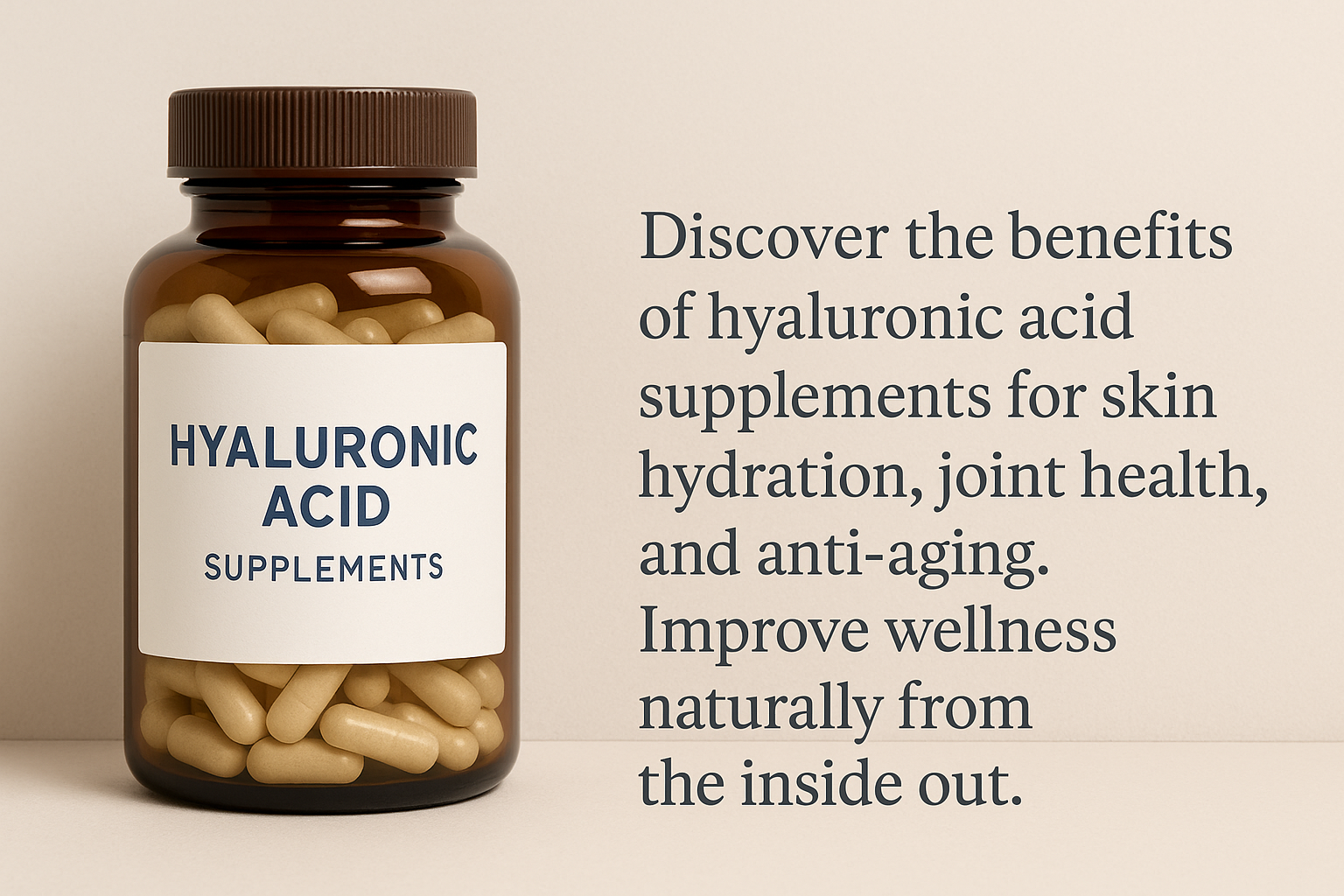Hyaluronic acid (HA) is best known in the skincare world for its ability to hydrate the skin, but did you know it’s also available as an oral supplement? From reducing joint pain to improving skin texture, hyaluronic acid supplements are gaining popularity fast. However, as with any supplement, there are both benefits and possible side effects you should know about before adding it to your routine.
In this guide, we’ll cover everything you need to know about hyaluronic acid supplements—how they work, who should take them, and whether they’re truly worth it.
What is Hyaluronic Acid?
Hyaluronic acid is a naturally occurring substance found in the body, especially in the skin, joints, and eyes. Its main job? Retaining moisture. It acts like a sponge, holding up to 1,000 times its weight in water. This helps keep tissues well-lubricated and cushioned.
As we age, the body produces less hyaluronic acid, which leads to drier skin, joint stiffness, and other signs of aging. That’s where supplements come in.
Benefits of Hyaluronic Acid Supplements
1. Improves Skin Hydration and Elasticity
One of the most well-known benefits is plumper, more hydrated skin. Oral HA supplements help the body retain water, leading to:
Reduced dryness and flakiness
Increased skin elasticity
Smoother skin texture
Study highlight: A 2017 clinical study published in Clinical, Cosmetic and Investigational Dermatology showed that daily HA supplementation improved skin moisture and elasticity in just 12 weeks.
2. Supports Joint Health and Reduces Pain
Hyaluronic acid is a key component of synovial fluid, the lubricant that helps joints move smoothly. Taking supplements may:
Reduce symptoms of osteoarthritis
Improve mobility in the knees and hips
Lower inflammation in joints
It’s often recommended alongside glucosamine and chondroitin for joint care.
3. Helps with Wound Healing and Tissue Repair
HA plays a role in wound healing by regulating inflammation and signaling tissue repair. Some research shows that oral HA can speed up recovery from cuts, burns, or surgeries.
4. May Support Eye Health
The eyes contain high levels of hyaluronic acid, especially in the vitreous humor (the gel-like substance inside your eye). Supplementation may:
Help maintain eye moisture
Reduce symptoms of dry eye syndrome
Support recovery after eye surgery (like LASIK)
5. May Prevent Bone Loss
Emerging research suggests HA may help preserve bone density by supporting osteoblast activity (bone-building cells). More studies are needed, but early results are promising.
6. Aids in Acid Reflux Relief
Interestingly, some supplements combining HA with chondroitin sulfate have shown effectiveness in soothing the esophagus lining and reducing acid reflux symptoms. These are typically targeted GI formulas.
Possible Side Effects of Hyaluronic Acid Supplements
While hyaluronic acid is generally safe and well-tolerated, some users may experience side effects, especially with high doses or when combining with other medications.
1. Mild Digestive Issues
Some people report:
Nausea
Bloating
Upset stomach
This usually happens when starting supplementation and may go away with time.

2. Allergic Reactions (Rare)
Most HA supplements are made from microbial fermentation, but animal-derived versions (like from rooster combs) may trigger allergies, especially if you’re sensitive to poultry products.
Symptoms to watch for:
Rash
Itching
Swelling
Difficulty breathing (seek emergency help)
3. Not Recommended for Certain Conditions
People with these conditions should consult a doctor before use:
Pregnancy or breastfeeding (limited research on safety)
Autoimmune disorders
Cancer history (especially hormone-sensitive types, since HA affects cellular signaling)
4. Interaction with Medications
HA might interact with:
Immunosuppressants
Blood pressure medications
Anti-inflammatory drugs
Always consult your healthcare provider if you’re on any prescription meds.
How to Take Hyaluronic Acid Supplements
Most oral HA supplements come in capsule or tablet form. They may also be part of beauty or joint-support blends.
Typical Dosage:
120–240 mg per day is common and safe for most adults.
Some studies used up to 300 mg with no harmful effects.
Tips for Best Results:
Take with water or a meal.
Combine with vitamin C or collagen for better skin results.
Select supplements with low-molecular-weight hyaluronic acid (HA) for improved absorption.
Who Should Consider Taking Hyaluronic Acid Supplements?
Adults with dry skin or signs of aging
People with joint pain or early osteoarthritis
Those with chronic dry eyes
Fitness enthusiasts with high-impact joints use
Anyone recovering from surgery or injury

Who Should Avoid It?
Pregnant or breastfeeding women (unless cleared by a doctor)
Individuals with known allergies to HA sources
Those taking medications that may interact
Cancer patients or survivors without medical supervision
FAQs
Is it safe to take hyaluronic acid daily?
Yes, HA is safe for daily use when taken in recommended dosages (120–240 mg/day). Long-term studies show no serious adverse effects.
How long does it take to see results?
For skin: around 4 to 12 weeks
For joints: around 8 to 12 weeks
Can I take it with collagen supplements?
Yes! Combining HA with collagen peptides and vitamin C may enhance the benefits for both skin and joints.
Do I still need a topical hyaluronic acid serum?
You can use both. Oral supplements work from the inside out, while serums target hydration on the surface of the skin.

